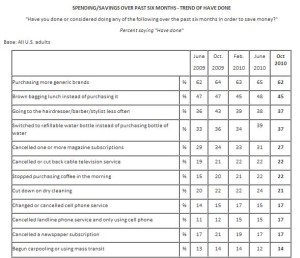
Last month, Harris Interactive released startling results regarding how consumers are cutting back during the economic slowdown: https://www.harrisinteractive.com/NewsRoom/HarrisPolls/tabid/447/ctl/ReadCustom%20Default/mid/1508/ArticleId/624/Default.aspx
Everything from forgoing regular visits to the salon to skipping the Starbucks run in the morning seems to have been impacted by the economic and unemployment mood. See this chart for all the details:

Over the 1.5 year study, the most consumer-embraced trend appears to be the purchase of generic products, rather than brand-name products and services.
At Mambo, brand name clients have been facing the dilemma of making a case for their superior products or services. One client said, “I’m selling a $4 item in a $2 economy”; another client asked, “How do I respond when a prospective student asks why my university costs 25% more than a state school?” My response is often: messaging. Top-shelf, brand name or exclusive brands must communicate their true value, consistently and creatively. Here are the four buckets of how to state your value and sway potential customers.
1. Quality. This one is a given. However your product or service encompasses better quality than a generic competitor, you need to emphasize it. Better ingredients? Personalized attention? 24-hour support? Endorsements from top scientists or organizations? Venture capital from Google? Locally-sourced materials? Then tell them that. Many times. As a persuasionist, you want to plant to the seed in the mind of the customer that maybe the generic is lacking in some key area.
2. Personality. If all products are the same, how can the consumer differentiate it? With personality. Tide is the classic example: There are many detergents that clean clothes, but the bright colors of Tide make it memorable, cause it to stick out on the shelf and communicate its brand promise of brighter colors per wash. Build up the brand personality of your product or service. What is the one emotion you want potential consumers to feel when they encounter your brand? Your messaging should communicate your brand’s uniqueness.
3. Humanity. Customers want to buy from brands that are listening, that are responsive, and that handle their concerns. If your company actively interacts with customers on social media properties, or takes customer service to the next level, or writes personal email responses to questions –tell prospects in advance! Who wants to do business with a faceless organization, where the staff has no stake in consumer experiences? In outbound messages, remind current and potential customers that your brand cares, and that it will ensure a supportive and personal experience. Social media channels, of course, are the ideal venue for this communication.
4. Flexibility. Generic products or services often have restrictions. You can’t customize the interface. It’s only available on 6 a.m. flights. It’s only valid with the purchase of an entire package. Brands should message on how flexible their service or product is to the individual customer and his or her needs. Today’s consumers expect much from each offer or experience – tell them you can suit to fit.
‘Value’ does not mean ‘cheap.’ Value encompasses the unquantifiable monetary value of avoiding problems, frustration and blandness – or most importantly, additional expense. The generica consumer experience suffers from issues of quality, personality, humanity, and flexibility. Brand marketers need to exploit this at every opportunity.



Sorry, the comment form is closed at this time.